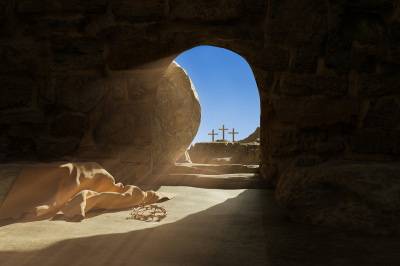
As Martha’s brother, Lazarus, lay four days dead in a tomb, Jesus told her, “I am the resurrection and the life. Whoever believes in Me will live, even though he dies. And everyone who lives and believes in Me will never die. Do you believe this?” (John 11:25-26).
It appears that without hesitation, Martha responded with conviction, “I believe that You are the Christ, the Son of God, who was to come into the world” (John 11:27).
Revealing her understanding of the Jewish Scriptures, Martha had previously professed that she believed in the resurrection of the dead at the last day.
She understood Job’s words, “But I know that my Redeemer lives, and in the end, He will stand upon the earth. And though after my skin worms destroy this body, yet in my flesh I will see God. I will see Him for myself; my eyes will behold Him and not as a stranger. How my heart yearns within me” (Job 19:25-27).
What an intimate and accurate view of life after death that was inscribed for Martha’s (and our) benefit. The Bible is clear that death is not the end of us. Martha believed this.
Easter invites us to answer the same question. Do we really believe that living for Jesus means we will never die? In short, do we believe in the resurrection?
Martha’s Answer: Yes
Religious leaders’ answer: No
The resurrection was a hotly divisive topic in Jesus’ day. We know the Sadducees, elitist religious leaders of Martha’s day, did not believe in the resurrection. They concluded the Pentateuch, or first five books of the Old Testament, were the only writings of value and thus rejected anything about angels, demons, and the afterlife. They viewed their money, wealth, and power as God’s providence and favor and worked to keep the inner circle of this ancient “good old boys club” tightly closed.
In Matthew 22:23-32, the Sadducees came to Jesus posing a fictitious question about someone in the afterlife — an afterlife which they claimed they did not believe in. Seeing through their question, Jesus addressed the real issue, telling them they were sadly mistaken regarding the resurrection.
He quoted a Scripture from the Pentateuch, knowing full well they were familiar with it. “But concerning the resurrection of the dead, have you not read what was spoken to you by God, saying, ‘I am the God of Abraham, the God of Isaac, and the God of Jacob?’ God is not the God of the dead, but of the living.”
Jesus was aware of their unbelief and taught about the resurrection. But they did not believe this.
The opposing Jewish religious leadership, the Pharisees, derived their status from being scholarly. Minute details of the letter of the law (that they themselves expanded, even down to how much spice to tithe) were known and rigorously taught. Their pride and security rested in how well they kept the law, while missing the point of those laws entirely.
Though they acknowledged the afterlife and resurrection of the dead, they were spiritually blind and dead in legalism and could not lead people to life after death. And when Jesus taught that even the Gentiles would be present and rewarded in the resurrection, it was too much for their law-loving hearts to bear.
Jesus was aware of their legalism and instead emphasized faith in regard to the resurrection. But they did not believe this.
Our answer: Yes or no?
Usually, the Sadducees and Pharisees were religious rivals, divided over their beliefs about the resurrection. So, it’s interesting that Jesus’ teaching about the resurrection was the thing that ultimately united them. Because Jesus insisted that resurrection life was found in Him alone, the two groups found something they could agree on: their desire to kill Jesus.
But that’s where the good news begins — and where we’re invited to answer the same question.
We are familiar with the brutal story of the cross of Christ Jesus. How could the bloody, shameful murder of our righteous Lord and Leader be seen as good news? Because of His resurrection! The resurrection of Christ Jesus from the dead is a victory for all the ages.
Where we were once dead because of sin, we now live by receiving the sacrifice of Christ. Adam was the first man to sin, and sin abounded. We know, we’re familiar with it. Sin results in separation from our perfect God and always produces death.
But just as death came through a man, the resurrection of the dead also comes through a man. For just as in Adam, all die, so also in Christ all will be made alive, resurrected with Christ.
I heard some form of this message when I was around 5-years-old. I have the memory of being stirred in my inner being, a knowledge that God had done something wonderful for us — for me. Without grasping the details until much later, the Spirit of God was quickening my spirit to set me free from the law of sin and death I was born into.
Without yet having the benefit of experiencing the physical resurrection of Jesus, Martha, too, was being quickened in her spirit to believe and receive this everlasting life soon to be offered by the resurrection of Jesus after He suffered and died in our place. She believed.
The religious were offered the same everlasting life. Jesus told them what they needed to know about the resurrection. As far as we know, they did not believe.
Now it’s our turn. Jesus’ question remains the same, and each of us has the opportunity to answer: “I am the resurrection and the life. Whoever believes in Me will live, even though he dies. And everyone who lives and believes in Me will never die. Do you believe this?”
Well, do you?
Cindi Killen is a Senior Chaplain through the International Fellowship of Chaplains. She serves as the assistant manager of the Spiritual Development team at Medi-Share where she has worked for 8 years. She and her husband of what she describes as over 40 short years share date nights and serve together at their church on the weekends. They have 7 adult children by birth and adoption, a small multitude of grandchildren, and always a house guest. Cindi enjoys walking and bike riding on trails, her husband’s cooking, and visiting small towns and out-of-the-way places. Her passion is to come alongside others encouraging them to live rooted and strengthened in the faith.


















